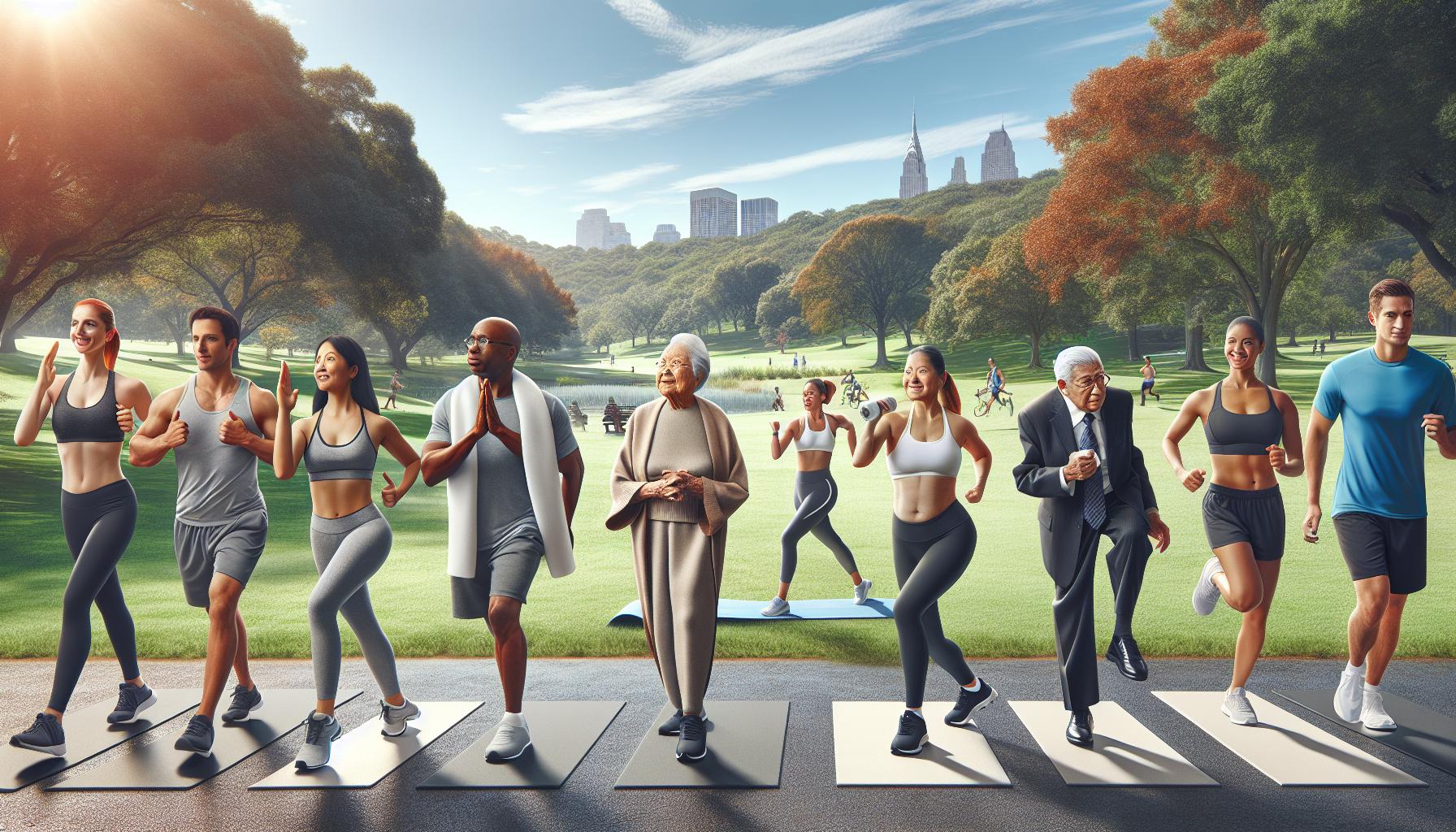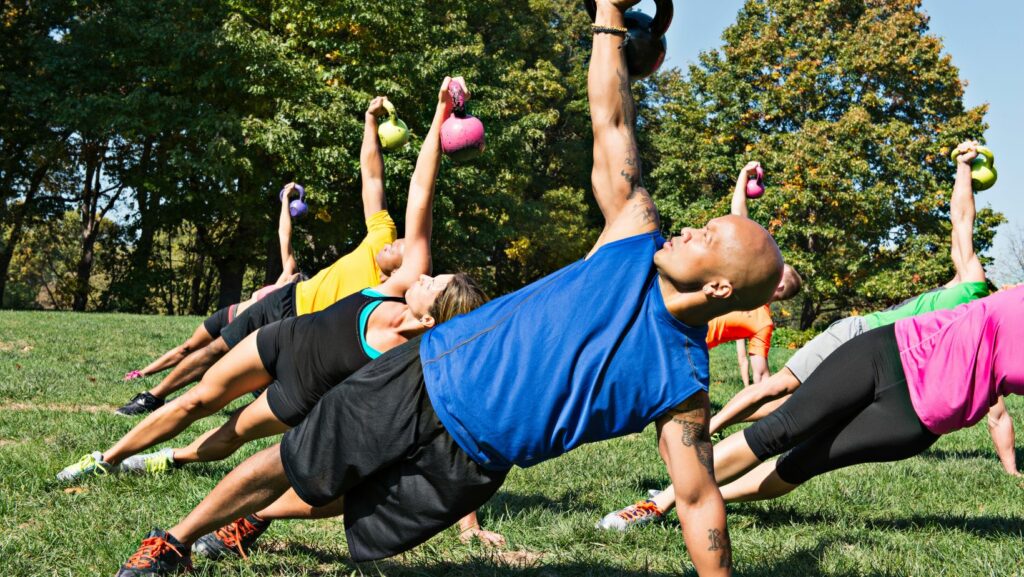 Fitness and Wellness
Fitness and Wellness
- Holistic Approach: Fitness and wellness go beyond physical health, encompassing mental and emotional well-being for a balanced life.
- Regular Exercise: Engaging in at least 150 minutes of moderate aerobic activity weekly, along with strength training, boosts overall health and energy.
- Nutrition Matters: A balanced diet rich in whole foods is essential for optimal energy levels, muscle recovery, and immune support.
- Sleep Importance: Quality sleep (7-9 hours) is crucial for recovery, mental clarity, and overall fitness performance.
- Mindfulness Practices: Incorporating mindfulness and meditation can significantly reduce stress and enhance emotional resilience.
- Community Engagement: Participating in group fitness classes provides motivation, social support, and improved adherence to exercise routines.
In today’s fast-paced world, fitness and wellness have become essential components of a balanced life. People are increasingly recognizing the importance of not just physical health but also mental and emotional well-being. This holistic approach empowers individuals to thrive in all aspects of their lives, leading to improved productivity and happiness.
Embracing fitness and wellness means integrating regular exercise, nutritious eating, and mindfulness practices into daily routines. It’s not just about hitting the gym or following the latest diet trends; it’s about cultivating a lifestyle that promotes overall vitality. As more individuals embark on this journey, understanding the principles of fitness and wellness becomes crucial for achieving lasting results and fostering a healthier society.
Understanding Fitness And Wellness
Fitness and wellness encompass physical, mental, and emotional well-being. Grasping these concepts lays the foundation for a healthier lifestyle.
Definition Of Fitness
Fitness refers to the body’s ability to perform physical activities without undue fatigue. It includes various components, such as cardiovascular endurance, muscular strength, flexibility, and body composition. Achieving optimal fitness requires regular engagement in activities like aerobic exercises, strength training, and stretching. These practices enhance overall health, boost energy levels, and improve performance in daily tasks.
Definition Of Wellness
Wellness represents a holistic approach to health, focusing on multiple dimensions, including emotional, social, spiritual, and environmental aspects. It involves actively pursuing a balanced life through self-care, healthy relationships, and personal growth. Wellness promotes resilience and the ability to cope with stressors, leading to improved quality of life. Engaging in mindfulness practices, maintaining a nutritious diet, and fostering supportive connections significantly contribute to this multifaceted well-being.
The Importance Of Fitness And Wellness

Fitness and wellness play vital roles in enhancing overall health. They contribute significantly to one’s quality of life by promoting both physical and mental well-being.
Physical Health Benefits
Regular physical activity reduces the risk of chronic diseases. Engaging in aerobic exercises, strength training, and flexibility routines improves cardiovascular health, builds muscle strength, enhances flexibility, and promotes healthy body composition. According to the Centers for Disease Control and Prevention (CDC), adults should aim for at least 150 minutes of moderate aerobic activity each week and muscle-strengthening activities on two or more days. These guidelines support better metabolic function and lower rates of obesity. Additionally, improving physical health leads to increased energy levels, better sleep quality, and enhanced immunity.
Mental Health Benefits
Fitness and wellness significantly impact mental health. Exercise releases endorphins, which act as natural mood lifters. Activities like yoga and meditation also reduce stress and anxiety levels. Research shows that regular physical activity can decrease symptoms of depression and improve cognitive functions. Engaging in social fitness activities or group classes fosters community connections, improving emotional resilience. The National Institute of Mental Health highlights that consistent exercise can lead to improved overall mood, increased self-esteem, and reduced feelings of isolation.
Key Components Of Fitness And Wellness

Fitness and wellness comprise several essential components that contribute to a balanced lifestyle. Focusing on exercise, nutrition, and recovery can enhance both physical and mental well-being.
Exercise And Activity
Exercise and activity play a crucial role in maintaining fitness. Regular aerobic activities, such as running or cycling, improve cardiovascular endurance and overall health. Strength training, including weightlifting or resistance exercises, builds muscular strength and supports metabolic health. Flexibility training, like yoga or stretching exercises, increases range of motion and prevents injuries. Incorporating hip flexor exercises can also enhance mobility and reduce the risk of lower back discomfort, especially for those with sedentary routines. Engaging in physical activities for at least 150 minutes per week, as recommended by the CDC, ensures comprehensive fitness and enhances energy levels.
Nutrition And Diet
Nutrition and diet significantly influence fitness and wellness. A balanced diet rich in nutrients optimizes energy levels, supports muscle recovery, and strengthens the immune system. Incorporating a variety of whole foods, such as fruits, vegetables, lean proteins, whole grains, and healthy fats, provides essential vitamins and minerals. Staying hydrated is vital for overall health, as water aids digestion, regulates body temperature, and maintains proper cellular function. Adopting mindful eating practices helps individuals recognize hunger cues and fosters healthier food choices.
Sleep And Recovery
Sleep and recovery are essential components for achieving optimal fitness and wellness. Quality sleep supports physical recovery and mental clarity, enabling better performance in daily activities. Adults require 7-9 hours of sleep per night for optimal functioning. Establishing a regular sleep schedule, creating a relaxing bedtime routine, and minimizing screen time before sleep promotes restorative rest. Additionally, incorporating rest days into exercise routines allows the body to repair, reducing the risk of injury and enhancing overall fitness progress.
Popular Fitness And Wellness Trends

Fitness and wellness trends continuously evolve, reflecting society’s focus on comprehensive health strategies. Current popular trends emphasize mindfulness practices and group fitness engagement.
Mindfulness And Meditation
Mindfulness and meditation form integral elements of contemporary wellness practices. Implementing daily mindfulness techniques, such as breath control, enhances emotional resilience and reduces stress. Research shows that sustained meditation practice leads to measurable improvements in attention span, anxiety reduction, and overall mental clarity. Programs like Mindfulness-Based Stress Reduction (MBSR) provide structured approaches for beginners seeking effective techniques. Mobile applications, including Headspace and Calm, offer accessible resources for regular practice, catering to various experience levels.
Group Fitness Classes
Group fitness classes promote community engagement and motivation while facilitating physical activity. Classes like HIIT (High-Intensity Interval Training), yoga, and spin cycling cater to diverse interests and fitness levels, often enhancing workout enjoyment. Studies indicate that individuals participating in group classes report higher adherence rates and improved performance outcomes compared to solo workouts. Benefits include social support, accountability, and expert guidance from qualified instructors, fostering a welcoming environment for all participants. As fitness studios and gyms expand their offerings, hybrid options combining in-person and virtual classes have gained traction, accommodating preferences for flexible participation.
Healthier Tomorrow
Embracing fitness and wellness isn’t just a trend; it’s a vital lifestyle choice that enhances overall quality of life. By integrating physical activity, nutritious eating, and mindfulness into daily routines, individuals can foster resilience and vitality. The multifaceted approach to health promotes not only physical strength but also emotional balance and social connections.
As society continues to prioritize holistic well-being, engaging in group fitness and mindfulness practices can lead to lasting benefits. Individuals who commit to these principles contribute to a healthier community and a more vibrant life. Prioritizing fitness and wellness today paves the way for a brighter, healthier tomorrow.



